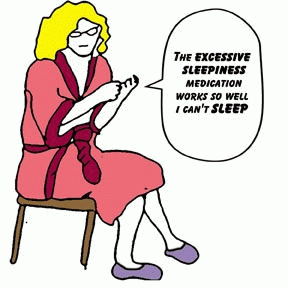| Back OpEd News | |||||||
|
Original Content at https://www.opednews.com/articles/They-re-Baaaaack-Old-Pill-by-Martha-Rosenberg-130501-720.html (Note: You can view every article as one long page if you sign up as an Advocate Member, or higher). |
|||||||
May 1, 2013
They're Baaaaack--Old Pills for New Conditions
By Martha Rosenberg
Pharma isn't going to deliver dappointing earnings to Wall Street just because it has few new drugs coming online and has failed at its very purpose. It is recycling old for brand new uses.
::::::::
The blockbuster pill profit party is over for Big Pharma. Bestselling pills like Lipitor, Seroquel, Zyprexa, Singular and Concerta have gone off patent with nothing new in the product pipeline. But Pharma isn't going to deliver disappointing earnings to Wall Street just because it has few new drugs coming online and has failed at its very purpose. It is recycling old for brand new uses.
Repurposing Ritalin
Now that Pharma's succ eeded in getting five million children and four to eight million adults diagnosed with ADHD, it's looking for new markets for the drugs. One new use for Ritalin (methylphenidate), the grandfather of ADHD drugs, could be for eating disorders. Researchers say a woman who suffered from bulimia nervosa, bipolar I disorder, cocaine and alcohol dependence, attention-deficit hyperactivity disorder and panic disorder "achieved a sustained (>1 year) remission" when methylphenidate was added to her other drugs.
Then there's pregnant women. A new paper suggests that women should stay on their methylphenidate during pregnancy because taking it away may "may present a significant risk" and that, "In all cases, children developed normally and no adverse effects were reported," though they were exposed in utero. Yes, kids can be given ADHD meds at even younger ages--as fetuses.
Pharma is also looking at the elderly as a new market for ADHD drugs. Methylphenidate may "improve gait function in older adults," researchers wrote recently. And a major clinical trial sponsored by Johns Hopkins Bloomberg School of Public Health is underway to see if methylphenidate can reduce apathy in Alzheimer patients. Of course many Alzheimer patients don't have apathy but agitation and aggression; they will be excluded.
Insomnia Drugs for Depression
Insomnia has been a gold mine to Pharma because everyone sleeps or watches late night TV when they can't. To goose the insomnia market, Pharma has created subcategories of insomnia-- chronic, acute, transient, initial, delayed-onset and middle-of-the-night as well as early-morning wakening non-restful sleep. Your insomnia is as unique as you are! It is also no coincidence that "wakefulness" medications cause insomnia and insomnia drugs, because of their hangover, create a market for wakefulness drugs.
Now Pharma is announcing that insomnia is actually a "risk" factor for depression and "that treating insomnia can help treat depression." The American Psychiatric Association's new Diagnostic and Statistical Manual due in May (DSM-5) also newly pathologizes sleep. Considered the Bible of psychiatric drug treatments that end up being funded by insurers, the latest Manual has revised the way that insomnia is diagnosed and classified. "If sleep disturbance is persistent and impairs daytime functioning, then it should be recognized and treated," write authors in a paper the December issue of the Journal of Clinical Psychiatry. [i]
Recycling Neurontin
The seizure drug Neurontin (gabapentin) has not been Pharma's finest hour. A division of Pfizer Inc., pleaded guilty in 2008 to illegally promoting it for bipolar disorder, pain, migraine headaches, and drug and alcohol withdrawal when it was only approved for postherpetic neuralgia, pain after shingles and epilepsy, paying $430 million. Oops. Pï¬zer actually promoted the illegal uses while under probation for illegal activities related to Lipitor and later promoted illegal uses for a similar drug, Lyrica, while under the Neurontin agreement! [ii] See: incorrigible.
To sell Neurontin, Pfizer's Parke-Davis launched an elaborate "publication plan" to get marketing papers disguised as science in medical journals. In just three years, Parke-Davis planted 13 ghostwritten articles in medical journals promoting off-label uses for Neurontin including a supplement to the prestigious Cleveland Clinic Journal of Medicine that Parke-Davis made into 43,000 reprints for its reps to disseminate. See Doc, it says right here"..
And there was more duplicity. In 2011, three years after its $430 million settlement, Pfizer's STEPS trial ("Study of Neurontin: Titrate to Effect, Proï¬le of Safety") was reported to also be a con--a sales tool created to inspire the 772 investigators participating in the trail to personally prescribe Neurontin not a scientific study. Recently, the new uses for Neurontin of chronic cough, menopause and insomnia are appearing in scientific literature. Why does no one seem to believe them?
END
Like Martha Rosenberg's new food and drug expose Born with a Junk Food Deficiency
on Facebook
[i] quote is in full paper not in the abstract;
[ii] Kaiser Foundation Health Plan, Inc. et al. v. Pï¬zer, Inc. et al., United States District
Court, District of Massachusetts, (Nov. 3, 2010).
Authors Bio:
Martha Rosenberg is an award-winning investigative public health reporter who covers the food, drug and gun industries. Her first book, Born With A Junk Food Deficiency: How Flaks, Quacks and Hacks Pimp The Public Health, is distributed by Random House. Rosenberg has appeared on CSPAN and NPR and lectured at medical schools and at the Mid-Manhattan Public Library.
